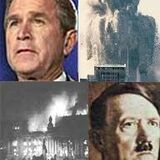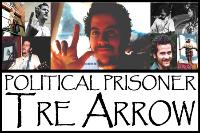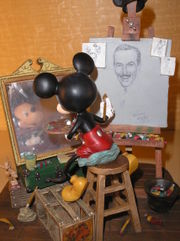Monday, September 17
Emperor Bush's Imperial Nakedness in Iraq Obvious to Foreign Press
Out of Alberta, the home province to Bush pal and Canadian Prime Minister Stephen Harper, we read the term "phoney" used to characterize King George II's recent television announcement of changing U.S. troop levels in Iraq. But the GOP's successful public lynching of former CBS News anchor Dan Rather in 2004-2005 after he risked similar truth-telling journalism may have permanently killed investigative reporting in the U.S.
Last Friday (14 September), the Edmond Journal called a spade a spade.
In its headline for CanWest News Service's Sheldon Albert's story on Bush's projected troop cuts he told America on TV--the primary source of news for two over every three Americans--the paper's online version read "Troop cuts phoney, Bush critics say."
Though I doubt the story made it into the paper's hard copy edition, the online assessment nonetheless demonstrates more integrity and courage--and truthfulness--than that routinely pursued by U.S. mainstream newspapers.
American editors and journalist are more "timid and frightened" when probing the Bush White House. That's what former CBS News anchor Dan Rather told the British Broadcasting Corporation in May 2002, months after the White House via the Patriot Act took unprecedented measures to stifle voices that questioned its version of the terrorist attacks on America.
Of course, Rather's U.S. news colleagues hadn't by 2004 resolved their own chronic historical amnesia nor recovered from post-9/11 cowardice to ask the difficult questions then needed of Thornburg's fitness to investigate CBS.
In 1989, with Iran-Contra still under congressional scrutiny, Thornburg refused to appear before or hand over files subpoenaed by a Democrat-controlled House Judiciary panel investigating the Justice Department's egregious prosecution of a murder in West Virgnia linked to sensitive but powerful criminal tracking software (Inslaw) that its developer Bill Hamilton claimed Thornburg's DoJ lawyers were using without compensation.
Washington Post columnist Mary McGrory was among a handful of reporters brave enough to question Thornburg's intransigence--and his refusal to appoint an independent prosecutor; his stance, some aver, served to insulate then-President Bush Sr. from further Iran-Contra recriminations, since John Kerry (and Bush's fellow Yale Bonesman) was still whitewashing--I mean "probing"--that scandal in the Senate. (1)
Instead of an example of responsible journalism, Dan Rather's efforts were reduced to a dark parable for any journalist who believes a Pulitzer Prize awaits them at the end of a probe into more White House phoniness.
==Notes==
1. Coterminous in the U.S. House, intelligence committee panel chair Democrat Lee Hamilton of Indiana assisted GOP ranking member Rep. Dick Cheney in derailing the Iran-Contra arms-for-drugs probe there. Fondly remembering Hamilton's service to his country when he became Bush II's vice president in 2000, Cheney recruited Hamilton to reprise his Iran-Contra theatrical performance as 9/11 Independent Commission co-chair, thus insulating Bush Jr. et al. from those 2001 "terrorist attacks". "In a late 1980s interview aired on PBS 'Frontline,' Hamilton said that he did not think it would have been 'good for the country' to put the public through another impeachment trial" with Nixon's banishment in 1973-74 still scaring the nation. Does any of this sound remotely familiar?
Last Friday (14 September), the Edmond Journal called a spade a spade.
In its headline for CanWest News Service's Sheldon Albert's story on Bush's projected troop cuts he told America on TV--the primary source of news for two over every three Americans--the paper's online version read "Troop cuts phoney, Bush critics say."
Though I doubt the story made it into the paper's hard copy edition, the online assessment nonetheless demonstrates more integrity and courage--and truthfulness--than that routinely pursued by U.S. mainstream newspapers.
American editors and journalist are more "timid and frightened" when probing the Bush White House. That's what former CBS News anchor Dan Rather told the British Broadcasting Corporation in May 2002, months after the White House via the Patriot Act took unprecedented measures to stifle voices that questioned its version of the terrorist attacks on America.
"It is an obscene comparison--you know, I am not sure I like it--but you know there was a time in South Africa that people would put flaming tires around people's necks if they dissented. And in some ways the fear is that you will be necklaced [in America], you will have a flaming tire of lack of patriotism put around your neck.The weepy Rather did, however, eventually find his ass and courage long enough during the 2004 presidential campaign to ask difficult questions still lingering over Bush's Vietnam War-era military service. But GOP activists and bloggers made him pay for his risk; they exploited CBS's coverage of allegedly false document to appoint former President Bush I's U.S. Attorney General Dick Thornbough (1989-1991) to investigate the matter, a move that culminated in the firing of a top producer and Rather's subsequent "retirement" from the evening news desk.Now it is that fear that keeps journalists from asking the toughest of the tough questions, and to continue to bore in on the tough questions so often. And again, I am humbled to say, I do not except myself from this criticism...."
Of course, Rather's U.S. news colleagues hadn't by 2004 resolved their own chronic historical amnesia nor recovered from post-9/11 cowardice to ask the difficult questions then needed of Thornburg's fitness to investigate CBS.
In 1989, with Iran-Contra still under congressional scrutiny, Thornburg refused to appear before or hand over files subpoenaed by a Democrat-controlled House Judiciary panel investigating the Justice Department's egregious prosecution of a murder in West Virgnia linked to sensitive but powerful criminal tracking software (Inslaw) that its developer Bill Hamilton claimed Thornburg's DoJ lawyers were using without compensation.
Washington Post columnist Mary McGrory was among a handful of reporters brave enough to question Thornburg's intransigence--and his refusal to appoint an independent prosecutor; his stance, some aver, served to insulate then-President Bush Sr. from further Iran-Contra recriminations, since John Kerry (and Bush's fellow Yale Bonesman) was still whitewashing--I mean "probing"--that scandal in the Senate. (1)
The man who could have resolved the Inslaw case, Dick Thornburgh, resigned as attorney general on the day the West Virginia police came forward with their autopsy on Casolaro. Excess was the hallmark of the Thornburgh's farewell ceremony: an honor guard, a trooping of the colors, superlatives from subordinates. William P. Barr, his deputy and possible successor, spoke of Thornburgh's "leadership, integrity, professionalism and fairness"--none of which Thornburgh displayed in his handling of Inslaw. What was merely sinister has now turned deadly. Thornburgh calls Inslaw "a little contract dispute" and refused to testify about it to the House Judiciary Committee. [Former Nixon Counsel Eliot] Richardson thinks it could be "dirtier than Watergate," and, as a victim of the scandal, he should know. Thornburgh's conduct is the most powerful reason for believing that Danny Casolaro really saw an Octopus [an allusion to the U.S.'s Secret Government's ongoing global criminal enterprises] before he died.By 2007, Canadian journalists realize the imperial White House's policies in Iraq are "phoney" and reported, perhaps belatedly, it that way. But the situation is quite different in the U.S. Buy by this late date, ladies and gentlemen, those among us with IQs above room temperature realize few things sought by DC politicos in the name of "the American people" are not phoney.
Instead of an example of responsible journalism, Dan Rather's efforts were reduced to a dark parable for any journalist who believes a Pulitzer Prize awaits them at the end of a probe into more White House phoniness.
==Notes==
1. Coterminous in the U.S. House, intelligence committee panel chair Democrat Lee Hamilton of Indiana assisted GOP ranking member Rep. Dick Cheney in derailing the Iran-Contra arms-for-drugs probe there. Fondly remembering Hamilton's service to his country when he became Bush II's vice president in 2000, Cheney recruited Hamilton to reprise his Iran-Contra theatrical performance as 9/11 Independent Commission co-chair, thus insulating Bush Jr. et al. from those 2001 "terrorist attacks". "In a late 1980s interview aired on PBS 'Frontline,' Hamilton said that he did not think it would have been 'good for the country' to put the public through another impeachment trial" with Nixon's banishment in 1973-74 still scaring the nation. Does any of this sound remotely familiar?











